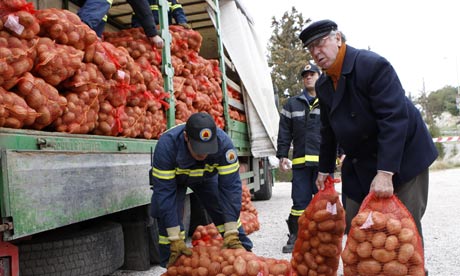Jon Henley is in Athens finding out how ordinary Greeks are pulling together to cope amid the financial meltdown
Residents in Athens carry bags of cheap potatoes bought directly from Greek farmers at cost price, one of the burgeoning ways to cope in the worsening financial crisis. Photograph: KeystoneUSA-ZUMA / Rex Features
Dozens of readers have sent me suggestions about places to go and people to meet in my search for stories behind the headlines in Athens, and I'm following up as many as I can. Others have sent me their own contributions.
Tales of solidarity come from Victoria Prekate, an Athens secondary school teacher and psychologist, who relates how her colleagues in schools in the capital have been responding:
It has been a common secret among PE teachers for some time now that they don't expect pupils to do PE any more, because many of them are underfed and get dizzy.
They need to be discreet, as these underprivileged children don't wish to be exposed to their peers. In my previous school, the teachers arranged among themselves to give the school canteen some money, so that the canteen could give the child a snack, without embarrassing the child.
However, this was not enough. In many schools today, it is the parents' associations who come together, gather food and discreetly arrange to allocate it to those families of the school who are suffering. In co-operation with the teachers, they know which children in the school are hungry and in need of help. Again, they try to do it as discreetly as possible.
"Many families, suddenly left without work, are in shock and there is nowhere to turn. Social services are collapsing. They are not professional beggars. They are ordinary people like you and me, suddenly left with nothing. I know one area, where schools have specialised in what they gather: 1st primary school gather rice and legumes, 2nd vegetables, 3rd meat and chicken etc.Zenon Panoussis also mentions a whole string of local grassroots and semi-official self-help initiatives:
There are direct producer-to-consumer markets, collective bargaining schemes at supermarkets, organised boycotts of motorway tolls, and book fairs. In Rethimno, Crete, regular free markets take place where products and services are exchanged without money – and, consequently, without VAT.
Some local councils in Athens are helping their citizens avoid paying the new special property tax that was slapped onto electricity bills. The borough of Peristeri specifically has an entire service to collect the bills and file appeals on behalf of its citizens. They are also organising direct producer to consumer markets for staple products.Marie Le Du writes with news of a thriving, more traditional self-help network in Kifissia, in the northern suburbs of Athens:
These are traditionally viewed as the wealthy ones. However, beneath the veneer of apparent wealth, people have been suffering here, too. It is a different picture to downtown Athens in that you do not see the poverty on the streets in the same way.
People here are embarrassed to find themselves in reduced circumstances and are doing what they can to camouflage it. They will very reluctantly admit to not having enough to eat, pay bills or heat their houses.
With this in mind, our local Orthodox church (Agia Triada) did not organise a soup kitchen, but instead runs a food bank where people can donate food. Volunteers (mostly retired Greek women; my mother is one) then deliver the food to families that they have heard are in need (local news travels through the old-lady-network much more efficiently than any social media).
In an attempt to help the needy families preserve their dignity, they work in pairs and visit two or three families that are "their" families, dropping in for a coffee, chat, to catch up and give the food parcel discreetly, as part of the visit (it is traditional in Greek culture to take food/sweets to someone's house when they have you over for coffee).
The same old-lady-network (they call themselves Proneia, which literally translates as "providence") meets regularly and exchanges news as to who needs what in the area. This can be anything from clothes, food, money for medications to the fees someone may need to have surgery abroad. They raise the money by phoning to their friends, family, anyone who still has money.
A lot of self-help and charity in Greece has always taken place informally and discreetly. A lot of foreign friends are keeping cleaning ladies and nannies employed out of a sense of solidarity even though they are having to make other big cuts in their budget, because they know that these workers will get absolutely no benefits if they are left without work.
In my mother's block of flats there are tenants who have not paid rent in 10 months, yet the landlord is turning a blind eye. I think the bulk of self-help is happening on a personal level and goes undocumented rather than through any organised activist networks.
And I think that actually these informal networks have played a large part in maintaining some social cohesion in these difficult times. The question is, what will happen once the pensioners who run Proneia find themselves in dire straits?
Greece on the breadline: the children of Athens too hungry to do PE | World news | The Guardian
![The [Greek] European Tragedy](https://blogger.googleusercontent.com/img/b/R29vZ2xl/AVvXsEiWKI5s90SFm1wWTk6bs4p7CgslaC2SnYPsrZhb-B-smOufNNCSxCvpBLI9hOB-LsXZjir_PNmEiMk2-E62F3xkg96IoC6QFAaZAnPRTVH340IN9WBRmWJqPkjWlgyRj3zpALp7h6hvA58/s920/GkBack_new.jpg)
